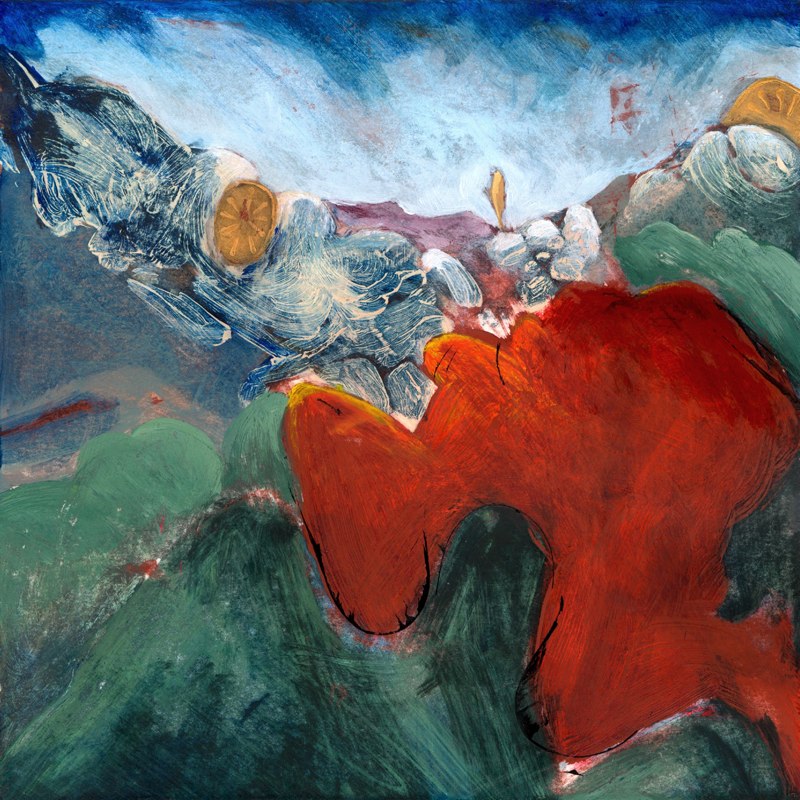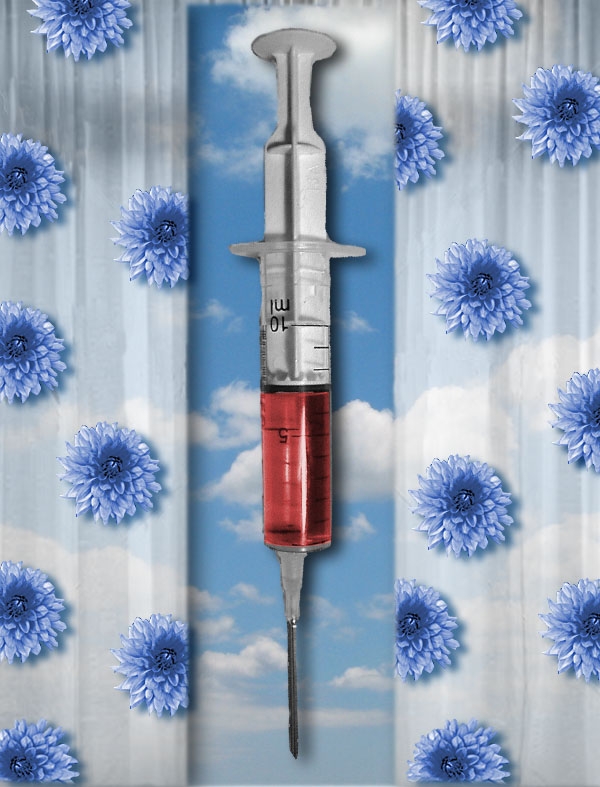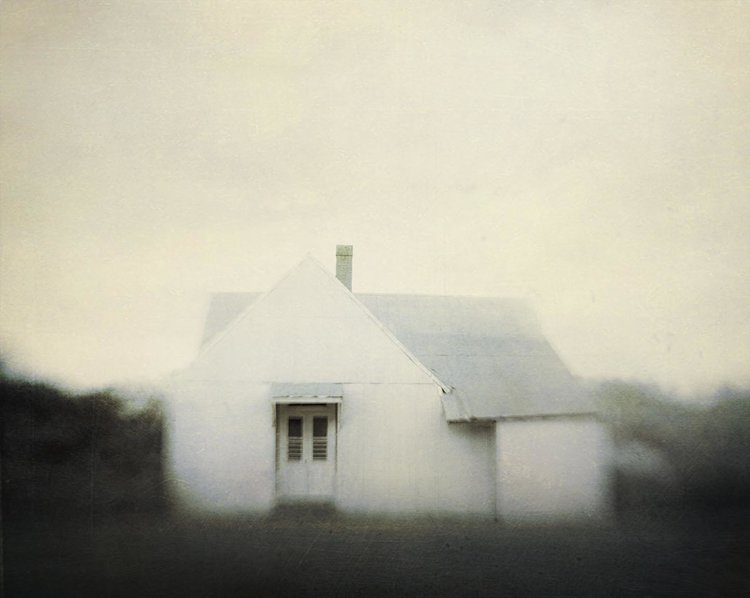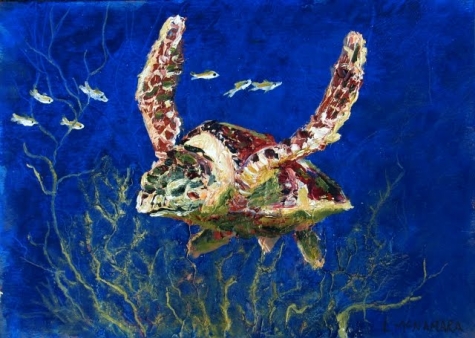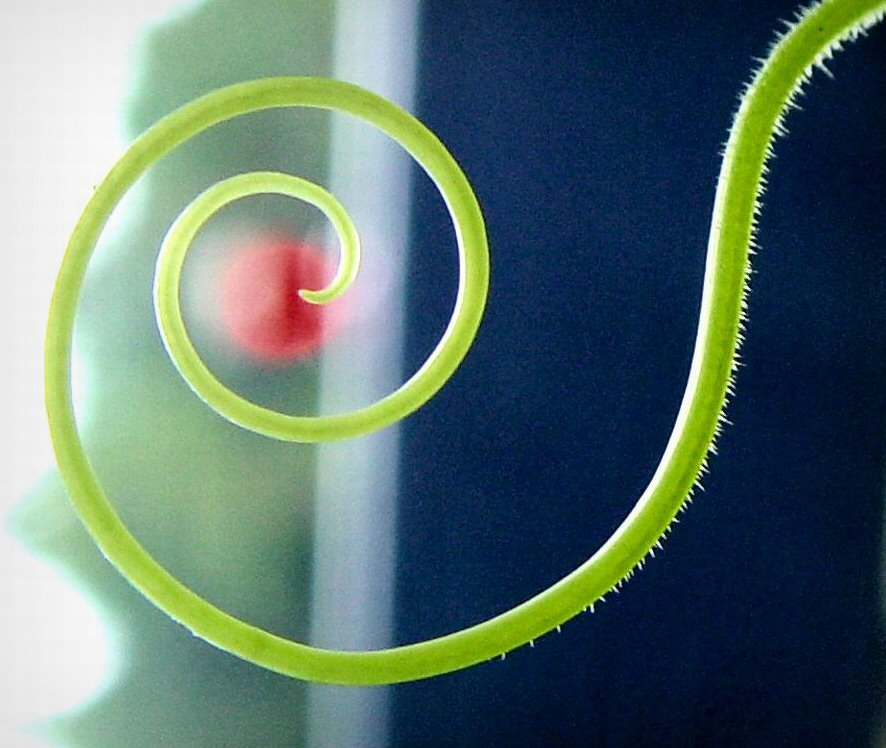
Image by Kristin Beeler, 2011.
(See also “Groceries” by Cathy Smith Bowers.)
I can feel the pink alabaster frog judging me even here, in the safe space of my reading corner at home.
“It’s rude to keep people waiting,” I hear it say in my father’s voice. I want to argue with it that my father has never been on time for me and, in recent years, has averaged not a few minutes or hours late, but days. Its stony eyes stay trained on me.
It was a gift from my father when I was a teenager. Until last month, I didn’t even realize I still had it, that it had followed me through more than a dozen moves, from trailers to dorm rooms to apartments to houses. I found it after the most recent move, away from the islands of Southeast Alaska and down to the desert of Southern California. When I brought a set of plastic storage drawers into my home office, I impulsively tugged on the handle of one drawer until it surged open like a toad’s tongue snapping for a fly. There sat the frog, perched on top of various forgotten art supplies, as shiny as the day Dad had given it to me.
I slid my thumb over its smooth skin until it landed on a pockmark. An imperfection. Surely, Dad didn’t know that was there. He might have said, “A perfect frog for my perfect girl,” when he gave it to me—he often professed lines like that. But he reminded me every day that I was not perfect, that I needed to try harder to be more like him. I dug my nail into the pockmark and then displayed the frog on my bookshelf, a reminder that I was making an effort to maintain a relationship with the man who’d brought me life—a resolution to forget how he’d left me questioning the value of my own existence.
Now I break the frog’s gaze and focus on my feet. I rub my toes on the carpet, trying to ground myself. Deep breaths. I tell myself I’m okay despite the fact that I can’t stop fidgeting with my phone, can’t break the frog’s echo of “rude,” and I definitely can’t slow my heart. It’s just your dad. Call him.
For years, no matter where I lived, this has been my routine every other Sunday. Wake up, drink coffee, have a panic attack, and call my dad. If I didn’t call, I’d be breaking one of Dad’s rules.
When I was growing up, there were a lot of rules, but they all boiled down to the same basic edict. I called it the Brussels sprouts rule: if your dad told you to like Brussels sprouts, you’d say, “Mmm,” and smile despite the gagging you couldn’t control. If you didn’t—I learned from watching my brother—you would be “restricted to your room” for the night, the weekend, or the week, depending on how much Dad was drinking. You might even be hit, maybe with a hand or maybe with a belt.
I always smiled and ate my Brussels sprouts.
The Brussels sprouts rule could be applied to anything. If an adult told you to vacuum, you smiled and did it. If you were told to go to bed at seven, when the sun was high in the sky and the neighborhood kids were still playing outside, you didn’t whine or ask why. You never questioned an adult, especially Dad. If you were told to let someone kiss you, you did it, no matter if that person made you want to cringe. Suppress it. Cringing would make the other person uncomfortable, and you could never let that happen.
And as a teen, when you wake up in a panic, in the fetal position, pushed as far against the wall as you can, briefly seeing your father tiptoe back out your bedroom door, you pretend it didn’t happen. Saying something to him, or to anyone else, might make him uncomfortable. Better to just roll over.
I don’t know who I would be now if it wasn’t for the Brussels sprouts rule. If I hadn’t been trained to shrink for men.
When I was twenty and studying abroad in Spain, I once went for a run and found myself on the deserted cobblestone streets during siesta. I slowed to savor the way my footsteps echoed off the stone walls in sync with my heartbeat, the way the sun was bright and hot on the top of the walls but down in the alleyways, the air was cool and calm. Then a man emerged from a side street and smiled as he looked me up and down.
“Bellísima,” he called to me, his arms reaching.
“Qué?” I asked. It’s bad manners to ignore someone who wants to talk to you—that’s the rule. He stepped closer, and my heart pounded, not just from the run anymore. I stepped back, only to find that I was already against the building. The narrow streets suddenly felt like a trap. I glanced around, searching for some other harmless stranger to intervene, but it was siesta. The whole city was sleeping off their sangría and paella.
He rattled off something in Spanish and then gestured to his lips. “Besos, besos.” As he leaned in, I could smell his breath, see the craters of his gums where teeth were missing.
“Lo siento, I’m late.” I wanted to run, but I hesitated. Don’t be rude.
“Es tradicion.” He persisted and leaned forward, kissing me first on one cheek and then the other.
The only part of my body that moved was my panicking heart, a jackrabbit in my chest. When he stepped back, I fled to the sound of his cackling.
Now I get up from my reading chair to look at the frog, straight in the eyes, ready to interrogate it. If I’d been raised with different rules, who would I be? Someone who kicked the Spaniard in the crotch and ran off? Someone who didn’t even stop? Someone who didn’t attract creeps in the first place?
But as usual, my anger quickly dissipates into self-flagellation and I sit down again. If it hadn’t been for my father, I wouldn’t know about the inner workings of an airplane, or the wonder of used bookstores, or countless other lessons he taught me. The carpet is matted down where I’ve been rubbing my feet, but no amount of grinding my toes in will make me feel grounded. It will only get worse the longer you wait, I tell myself. Just get it over with. Shakily, I scroll through my contacts and press Dial.
It hasn’t always been like this. I used to just do what he said without thinking about it. I devoured bottles of Tums, but as far as I knew, I wasn’t stressed about my relationship with my father, or with other men.
Dad asks me prying questions about my work, my boyfriend, my friends. I answer vaguely. “Oh, it’s good. Yeah, Tim’s good. He’s watching football. His team?”
My breath catches. How might my father use this detail to hurt me? Just playing the possibilities in my mind starts a crushing constriction around my ribs. He could start calling during every 49ers game, finding ways to put me on edge so when I hang up, Tim and I will fight. He used to do that when I was visiting my mom. “Oh, Tim doesn’t really have a specific team.”
Next he wants to know about my clients, which new books are coming out. I worry he’ll start showing up to their readings, waiting outside to confront me like he used to at my high school dances. I tell him there’s just a book about menopause and hope that scares him away.
I’m not sure when it dawned on me that my relationship with my father was not normal. That most women didn’t grow up fearing punishment for being late if track practice ran long, then worry that their fathers might not come home at all, both in the same night. But over time, those stomachaches turned into chest tightness, teeth grinding, rashes, heart palpitations, and chronic pain until I could no longer deny that something was wrong. I like to think my life would be drastically different without him. I like to think that I would be a strong woman who trusts her judgment and sets people straight when they bully her.
When I hang up, I think maybe I could be that person now. Maybe.
But recovery isn’t as simple as recognizing your childhood as traumatic and deciding to be different. I do speak up now, to other people, but only after years of therapy. I tell people when they’re rude, when they’re making unfair assumptions about me, when they’ve crossed into what is unwelcome personal territory. But it’s never without wondering if I’m overreacting, if the problem is really me. If I’m enforcing dysfunctional rules just like the ones that were once pushed on me.
I pick up the frog and heft it into the air, catching it again like a pitcher idly tosses a baseball. My body tenses with the dichotomy of it all. I want so much to be good, strong, in the right. I want to be intuitive and self-protective. But what if the offense I feel influences others to suppress themselves? I will never serve Brussels sprouts, but if I serve Greek salad and someone is upset about it, they should be able to say so, shouldn’t they? Even if I feel it’s rude?
I’m aware that things like this must seem so black and white to the functional adult. You put the Greek salad out as an offering. People can eat it or not. If they’re rude, you can say, “That was rude,” then you move on. You don’t dwell on it because it doesn’t matter. And you definitely don’t let a toothless man kiss you in an alleyway.
But for those of us who learned that following the rules to please others was a matter of self-preservation, this cognitive and emotional process is harder than rocket science. We must study it and practice it for years. We must talk ourselves through the story problems. We must take test after test and hope for a better score next time. We want to believe that at some point it will become second nature, but we know on some level that it will probably always be work. Hard work.
Two weeks have gone by since the last phone call. Tim and I get up, drink our coffee, and I go to my reading chair. The alabaster frog is still eyeing me, but I stare right back. I need a break, I tell it. I need to know what I’m like without him in my head. I’ve left my phone in the kitchen and brought a Psychology Today to my reading chair instead. I have a panic attack anyway, and by early afternoon, I put the frog back in its plastic drawer and go outside to garden. But I don’t call.
Four weeks later, I’m breathing easier. I’m letting go of rules and ignoring men who try to force their way into my space. Sundays still trigger me, though. On these days, the fears creep in. What if my father shows up at my house while Tim’s not at home, pushing his way in, interrogating me about why I’ve broken the rules? But with every day that that doesn’t happen, I start to relax. To live.
I want it to stay this way. If I picture having to let him in again, I cry. I repeat to my therapist over and over “I can’t do it. I just can’t do it” until she tells me I don’t have to. This can be my life now. Finally, I send him a letter to make it official: I’m going no contact.
After, comes the fallout. The calls. The letters. Stiff handwriting on envelopes made out to Tim’s and my new address in Oregon—the one I haven’t given to anyone for fear it would find its way to him. I recognize the gaslighting, thanks to Psychology Today. I bristle at the words “that never happened” and “your mother brainwashed you.” When I remember the alabaster frog, I dig through my boxes until I find it. Still grasping the latest letter in one hand, I clutch the frog in the other, wrapping my fingers around it and squeezing. It won’t give, no matter how strong I am, and I know in my aching bones that my father will never change.
The panic attacks come raging back, but they’re different now. Instead of crumpling under their pressure, I let the heart palpitations pump blood to my arms and legs and prepare me to fight. I drop the frog into a community garden bed and write back to my father with one simple message: No more.
Then…silence. Blissful quiet.
Two years later, my breath comes easily, my heart stays calm. It’s over.
Ali J. Shaw has Rocky Mountain air in her blood, but she calls the Pacific Northwest home. Her nonfiction has been featured in Hippocampus Magazine, VoiceCatcher, and the Dime Stories reading series, and was a finalist for the Victoria A. Hudson Emerging Writer Prize. She is currently at work on a memoir. Ali is an editor who collects typewriters and rescue animals.

















